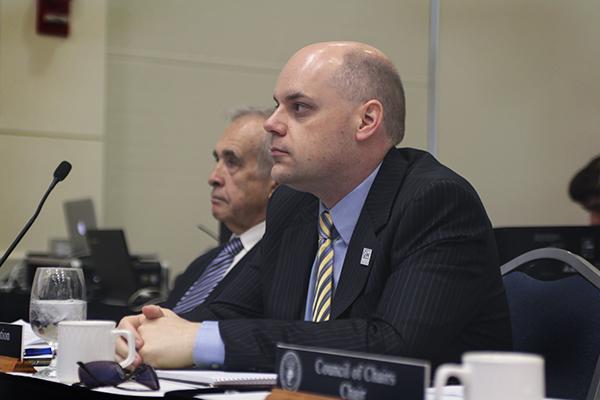Dozens of GW’s most-involved alumni will help pay students who take unpaid internships, the Alumni Association president announced Friday.
Jeremy Gosbee, the president of the Alumni Association, announced at the Board of Trustees meeting Friday that the Alumni Association’s Board of Directors has committed to establishing a fund that will raise $100,000 by 2018 to pay a stipend for students who take on unpaid internships. The announcement marks the first time the Alumni Association has relied on its board members to put the majority of donations toward a certain cause.
“Part of our job as alumni leaders is to be role models for other alumni,” Gosbee said at the meeting. “100 percent of our board is already giving to GW on an annual basis, but I was looking for a way to strengthen that impact.”
Gosbee added that the Alumni Association will match each board member’s donation with its own funds. He said board members won’t be required to donate solely to the scholarship fund, called the Colonials Helping Colonials Fund, but they’ll be encouraged to “take an extra step above what they normally do.”
He said last month that he wanted to increase the board’s engagement with alumni by inviting them to speak on campus or pairing them with students seeking career advice. The fund is just one of Gosbee’s recent efforts to create a more active and engaged board.
The fund will be run as an endowment fund and roughly $5,000 will go toward stipends for students who work unpaid internships each year. Gosbee said the fund can provide stipends for three or four students, but he hopes to see that number grow as donations come in.
“It’s a huge first step for us, but one I hope will be the first of many,” Gosbee said.
He said the board had considered funding other areas like scholarships and financial aid, but picked unpaid internships because members saw it as an “unmet need.” Members filled out a survey to make the decision, he said.
“We mapped out a few ideas for them and we saw which ones received the most response, and so the internship support was actually the one that came to the top of the heap,” he said.
The University has seen multiple donations recently toward career services, and has brought in at least $6 million in donations in the past two fiscal years from trustees like Mark Shenkman and George Wellde.
Steve Frenkil, a former president of the Alumni Association who finished his two-year term last year, said he worked with Gosbee last year to help identify the “broad support” that alumni had shown for the scholarship fund.
“It both helps enable the recipients to become interns and also sends a definitive message around the globe that Colonials helping other Colonials get ahead is an important and far-reaching GW value,” Frenkil said in an email.
Earlier this month, the University also unveiled a program for students in the School of Media and Public Affairs to finance their unpaid internships.
Before the board decided to put donations toward the program, they heard from students who have already received scholarships to supplement their unpaid internships. Rachel Brown, the assistant provost for University career services, also made a presentation.
Brown said in a release that students’ demand for the University’s current internship grant fund “continues to grow,” as more students apply for the grants.
The University has offered grants totaling between $1,000 and $3,000 for students’ unpaid internships since 2013 through the Center for Career Services. Students last year also lobbied administrators to lower the price that it costs to receive credit for internships.
“On behalf of the Career Services Council, I thank the GWAA Board for their leadership and generosity,” Brown said in the release.
Buddy Lesavoy, a member of the alumni board, said he supported funding unpaid internships because of the value of work experience on a resume.
“I think it speaks to the strong feeling that, as much as we can do to help get real life experience, the reality is that for many, it’s not an option because they need the financial assistance and support,” Lesavoy said. “This was a way to bridge the gap and get students that might not otherwise get the luxury of that option to get the best of both worlds.”
Christine Carnavos, another Alumni Association board member, said she became interested in students pursuing internships when she helped review applications for the career center’s pre-existing fund for unpaid internships.
“It was actually exciting to see students propose different internship opportunities that would help further their specific career interests, professional interests, explaining that why, if it was unpaid, it would be helpful to get paid for it,” Carnavos said.







